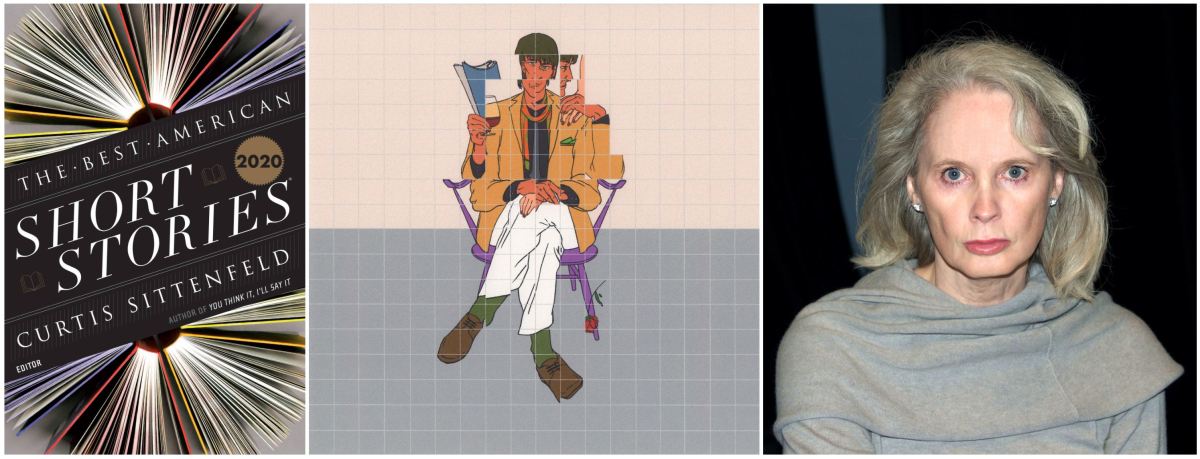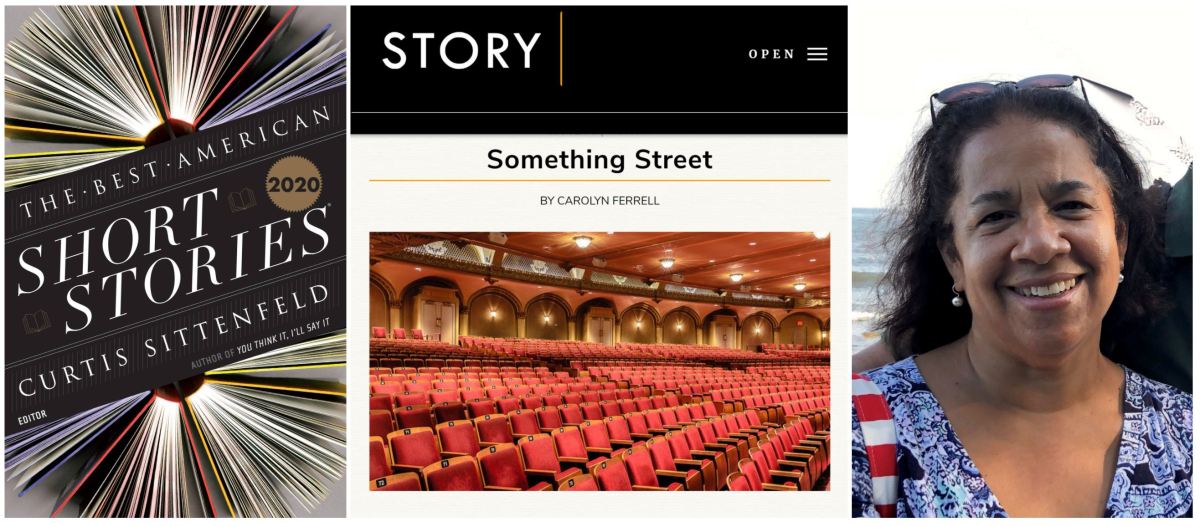by James Wallace Harris, Tuesday, November 10, 2020
I’ve read “Godmother Tea” by Selena Anderson several times now trying decipher her message in a bottle, which is how I picture short stories. To me, we’re all isolated on our own deserted islands of consciousness. No matter how physically close we get, we’re all still very far apart mentally in comprehending one another. Fiction, that is the best of fiction, is a coded message from one conscious mind given to another.
I don’t mean to imply that literary writers have a philosophy to push, but I believe the best of them strive to describe something quite specific they’ve observe about reality with the best words and phrases they can find. However, no decoding of those words can ever lead to perfect telepathic communion.
There are a number of factors to consider when decoding a short story. The first thing to ask: “Whose story is it?” This can be simple to answer, or complex, or even multiplexed. In “Godmother Tea” Joy is a young black woman dealing with her unhappiness and loneliness. She has being abandoned by her lifelong best friend, the man she wanted to marry, and she is tormented by personal critiques from her mother, relatives, ancestors, friends, strangers, possessions, and even an imaginary godmother. Is Joy having an identity crisis? Is she worried that she is too white or not black enough? Is Joy a chronically dissatisfied human, or just having trouble growing up?
There is another level to consider when asking whose story is it. Is Joy merely a made-up character, or does she embodied any personal insights and characteristics of the author, Selena Anderson? All my favorite literary fiction has elements of the autobiographical. Roman à clef writing has gone out of fashion, but that doesn’t mean Anderson hasn’t used her own life as grist for the mill of her fiction.
One small clue I have that this story might be based on memory, is at the party, “some fool was playing Spice Girls on the violin.” The Spice Girls were popular in the mid-1990s. But that’s the kind of observation you save for a story, although that means Anderson has been working on this tale for a very long time. I did find this quote by Anderson:
My dissertation is a collection of stories about people who want to win and who make a bad situation worse by trying to do something about it. The stories are set in Texas—but in my imagined Texas of the recent past. There are ghosts, tiny men, a slave ship, dolls, dudes who talk in third person, forest fires, and plenty of girls brooding in their apartments.
Joy is definitely a girl brooding in her apartment making a bad situation worse by trying to do something about it. However, I also found an interview with Anderson talking about the writing of “Godmother Tea” and it doesn’t offer much hope that it’s about her (although in a couple places she mentions that some observations were based on the real world.)
The reason I love literary fiction, and even how I personally define it, is by it’s biographical/autobiographical feel. Literary writing is dominated by characterization that goes way beyond what genre characterization attempts. In short stories especially, literary writing feels like you are getting inside someone’s head. That’s why I say literary fiction feels biographical in third person or autobiographical in first person. It doesn’t have to be real biography/autobiography, just feel like it.
“Godmother Tea” by Selena Anderson has the prestige of having the pole position for the BASS 2020 anthology. That means the editors really admired this story, and the one they expected to hook book buyers. It begins:
Just like my mama. She rolled up with a gift: a life-sized mirror edged by baroque curling leaves, with slender gold feet that somehow supported both its shimmering weight and mine. My mother has a knack for messy presents. Day passes to the gym, Merry Maids coupons, flat irons with built-in conditioner. This, however, was especially rude. A mirror would only reflect me, plus all my sulky auras, plus the cultivated environment that had drawn me this way.
Right away we know the narrator doesn’t want to see herself or how she lives. We don’t know immediately that the narrator is a woman, but it’s what I’m guessing. Moms don’t usually by their sons mirrors, and sons don’t usually worry about being judged or consider themselves sulky.
I did not know the author was black until after I read the story and began researching this blog. I didn’t know the character was black until later in the story, although I had my guesses. We don’t even learn her name right away, and then we discover this unhappy young woman is named Joy.
The main virtue of reading literary short stories is seeing inside people unlike ourselves. As an old white guy I expect most of these BASS 2020 stories will be about people much different from myself. Although Joy is African American her story isn’t about race. If anything, I feel it’s more about gender because Joy’s thoughts, observations, worries, and feelings aren’t anything like mine, or the guys I know, but are quite common with my women friends. But Joy’s problems are also about being young, something that’s becoming ever more alien to me.
A challenge to writers is to find a way to relate to the universal but present the specific. As readers we want novelty but we also need to resonate with the protagonist. Anderson lets us know the many ways in which Joy doesn’t like herself, and even why her friends are turning against her.
Joy is quite perceptive, quite smart. Is her suffering due to being too intellectual? Is her hyper-awareness of her situation the real cause of her anguish?
Joy’s mom obviously gives her gifts to help her improve her self esteem. Poor Joy has worn out her best friend who is leaving her, and rejected a boyfriend who was trying to help her. Joy knows all of this, and some of it comes out in an imaginary Godmother Joy creates to lecture herself. I wonder if Anderson wrote this story as a form of her own self realization.
Of course, we can’t know the answer to that. But I consider it a quality of good literary writing to wonder about such motives. On the other hand, would-be writers are taught to put their main character through the wringer, and maybe Anderson thought it would be fun to create Joy so we could watch her suffer.
Strangely, Anderson gives some of the best lines not to Joy, but to characters around her. Her best friend Nicole is moving on but still tries to help Joy by taking her to a party.
“You on the computer too much,” said Nicole. Someone passed her a plate of intricately painted chocolates that she rationed with me only. We were supposed to take one and pass them down.
“Only because I’m heartbroken,” I said, “and failing. I’m not sure if we can take it anymore.” I was speaking vaguely about everything, so when Nicole said she knew what I meant, firecrackers went off in my face and hands.
“I was just thinking about that the other day,” said Nicole. “I was wondering if I had the heart to do this work again. Like, could my heart break one more time? Then I came across the website of a woman who fostered medically fragile babies. Apparently when a newborn is terminal, the parents can give up their rights if they know they won’t be able to handle the medical bills. These newborns have nobody, so this woman would bring them home. Every now and then one would get better and be adopted, but most of them died in her living room. After about the tenth dead baby, her little son asked when they were getting another one. The mom told him it was too hard on her, she just couldn’t take it. And her son replied, ‘So we aren’t going to help any more babies because you can’t take it?’ ”
“I hadn’t thought of it that way,” I said. I looked Nicole up and down. “That story reminded you of me?”
“It reminded me of a lot of things,” she said. She turned a cocoa-dusted truffle between her fingers as though contemplating my future. “When you think of quitting on yourself,” she said, “just remember the mom and the babies.” But I was stuck on the little son who couldn’t get enough of baby-death, who had also put their sad life in perspective. Without him the mother never would have noticed.
Nicole leaves both Joy physically and emotionally at the party and Joy overhears:
“It may be over between us,” the blond person said, “but I just have to say, right now, you are nullifying my entire life.”
I turned away. I didn’t like to hear somebody’s life get nullified. People have the right to withhold their attention. I’ve done it. And when André did it to me, I’d believed I was special. My heartache was delicious. It turned me into an outcast. I would cling to him until he said something devastating, like Take it easy.
Joy then leaves the party to confront André, the man she rejected but still wants, first on the phone, and then at his house. Joy hears Porsche, the new girlfriend, say in the background: “All shut eyes ain’t sleep” and “You don’t apologize to a roach once you spray it” which Joy comments to us “It takes skill to get to that level, years if you study really hard.”
In the end, Joy achieves some insights that let us feel she’s going to be better, but I’m not sure I buy them. Jake Weber takes a deep look at Joy’s identity problem at his blog Workshop Heretic. He thought the story was more about black identity than I did, and there are hints in the story to suggest that. But I thought the story was more about being judged, with Joy being her own harshest critic. Joy sees herself as a failed artist, whose apartment reflects other people’s tastes, who can’t dress in style or put on makeup properly, who seeks identity by cooking world cuisine that others consider slop, whose best friend has grown bored of her even when she’s making exciting observations, and her lover has moved on with a women that has more insight about people and relationships.
“Godmother Tea” is stuffed with witty lines, but my favorite was “It was April and I liked to be alone.” Joy is a person who lives in her head trying to figure out who she should be by all the external judgments made about her. I believe Selena Anderson’s story captures this wonderfully. Because she has painted Joy’s inner world so vividly that I wonder if she used herself as a model.
Other Bloggers Reviewing BASS 2020 This Year:
Other Stories by Selena Anderson:
Menu: The Best American Short Stories 2020 Project
JWH



